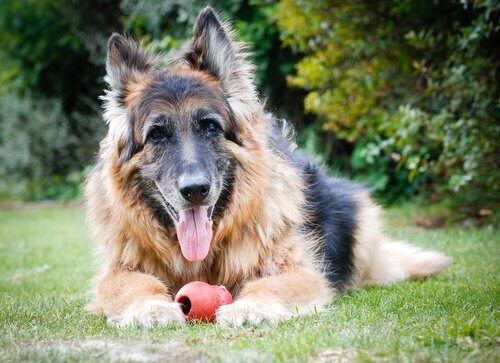How to Detect Canine Brain Aging

As they get older, dogs (just like humans) start to develop health problems due to their advancing years. One of these is known as canine brain aging, which causes gradual changes in the dog’s normal behavior. However, with the right diet, you can control this deterioration.
Canine brain aging: a difficult problem to detect
Reduced brain function causes behavioral changes in half of all dogs older than 8 years of age.
Despite this, only 12% of owners actually tell their vet about these changes. They think that these changes are completely normal because of their age, and therefore, they don’t need treatment.

Additionally, it’s not easy to detect canine brain aging in a normal routine veterinary check-up.
But even though the signs are not easy to spot at first, they will get worse, gradually reducing your dog’s quality of life if he doesn’t get prompt treatment.
Early diagnosis of canine brain aging and giving your dog a specially designed diet to alleviate the problem will make your dog’s later years much better.
Learn how to recognize the signs of canine brain aging
One of the main things that could indicate canine brain aging is disorientation. Pay attention to your dog’s behavior and take him to the vet if you notice any of the following:
- Reduced interaction – For example, if your dog isn’t as enthusiastic to greet you, doesn’t demand attention, doesn’t seem interested in play, or doesn’t respond to your calls
- Appears less alert
- Seems to have trouble moving or moves around aimlessly
- Appears to be lost in places that he knows well
- Doesn’t recognize family members or daily routines
- Stares at a wall or into space
Other possible signs
Dogs suffering from canine brain aging can often display some of the following changes in behavior:
- Changes in sleep pattern: Sleeping more during the day and less at night.
- Moving around the house at night and barking without an obvious reason.
- Loss of bladder or bowel control. Going to the toilet in any old place.
- Not asking to be let out to go to the toilet.
How to treat your dog if he is suffering from canine brain aging
Canine brain aging can be slowed by giving your dog a specific diet.
It consists of a combination of antioxidants and nutritional co-factors which includes:
- Vitamins C and E
- Lipoic acid
- Omega-3
- Phosphatidylserine
- L-carnitine acetyl
When this diet was given to dogs suffering from canine brain aging, it was shown that after three months, 74% had fewer accidents at home. Furthermore, 61% regained their enthusiasm in greeting members of the family.
Early diagnosis is fundamental

There is no doubt that early diagnosis and the right treatment will greatly improve your dog’s quality of life in those later years.
Therefore, if your dog is getting old, pay close attention to any changes in behavior. If you notice anything, go straight to your vet to see if they are related to canine brain aging.
Don’t forget, at first, the changes can be quite subtle or almost unnoticeable to a distracted owner. They will get much more noticeable as time goes by and the various symptoms will gradually get worse.
This is what makes an early diagnosis so important. So, take much care and pay close attention to your dog. He’ll be sure to repay you with lots of love.
As they get older, dogs (just like humans) start to develop health problems due to their advancing years. One of these is known as canine brain aging, which causes gradual changes in the dog’s normal behavior. However, with the right diet, you can control this deterioration.
Canine brain aging: a difficult problem to detect
Reduced brain function causes behavioral changes in half of all dogs older than 8 years of age.
Despite this, only 12% of owners actually tell their vet about these changes. They think that these changes are completely normal because of their age, and therefore, they don’t need treatment.

Additionally, it’s not easy to detect canine brain aging in a normal routine veterinary check-up.
But even though the signs are not easy to spot at first, they will get worse, gradually reducing your dog’s quality of life if he doesn’t get prompt treatment.
Early diagnosis of canine brain aging and giving your dog a specially designed diet to alleviate the problem will make your dog’s later years much better.
Learn how to recognize the signs of canine brain aging
One of the main things that could indicate canine brain aging is disorientation. Pay attention to your dog’s behavior and take him to the vet if you notice any of the following:
- Reduced interaction – For example, if your dog isn’t as enthusiastic to greet you, doesn’t demand attention, doesn’t seem interested in play, or doesn’t respond to your calls
- Appears less alert
- Seems to have trouble moving or moves around aimlessly
- Appears to be lost in places that he knows well
- Doesn’t recognize family members or daily routines
- Stares at a wall or into space
Other possible signs
Dogs suffering from canine brain aging can often display some of the following changes in behavior:
- Changes in sleep pattern: Sleeping more during the day and less at night.
- Moving around the house at night and barking without an obvious reason.
- Loss of bladder or bowel control. Going to the toilet in any old place.
- Not asking to be let out to go to the toilet.
How to treat your dog if he is suffering from canine brain aging
Canine brain aging can be slowed by giving your dog a specific diet.
It consists of a combination of antioxidants and nutritional co-factors which includes:
- Vitamins C and E
- Lipoic acid
- Omega-3
- Phosphatidylserine
- L-carnitine acetyl
When this diet was given to dogs suffering from canine brain aging, it was shown that after three months, 74% had fewer accidents at home. Furthermore, 61% regained their enthusiasm in greeting members of the family.
Early diagnosis is fundamental

There is no doubt that early diagnosis and the right treatment will greatly improve your dog’s quality of life in those later years.
Therefore, if your dog is getting old, pay close attention to any changes in behavior. If you notice anything, go straight to your vet to see if they are related to canine brain aging.
Don’t forget, at first, the changes can be quite subtle or almost unnoticeable to a distracted owner. They will get much more noticeable as time goes by and the various symptoms will gradually get worse.
This is what makes an early diagnosis so important. So, take much care and pay close attention to your dog. He’ll be sure to repay you with lots of love.
All cited sources were thoroughly reviewed by our team to ensure their quality, reliability, currency, and validity. The bibliography of this article was considered reliable and of academic or scientific accuracy.
- Vite, C. H., & Head, E. (2014). Aging in the canine and feline brain. Veterinary Clinics of North America – Small Animal Practice. https://doi.org/10.1016/j.cvsm.2014.07.008
- Cotman, C. W., Head, E., Muggenburg, B. A., Zicker, S., & Milgram, N. W. (2002). Brain aging in the canine: A diet enriched in antioxidants reduces cognitive dysfunction. Neurobiology of Aging. https://doi.org/10.1016/S0197-4580(02)00073-8
This text is provided for informational purposes only and does not replace consultation with a professional. If in doubt, consult your specialist.








